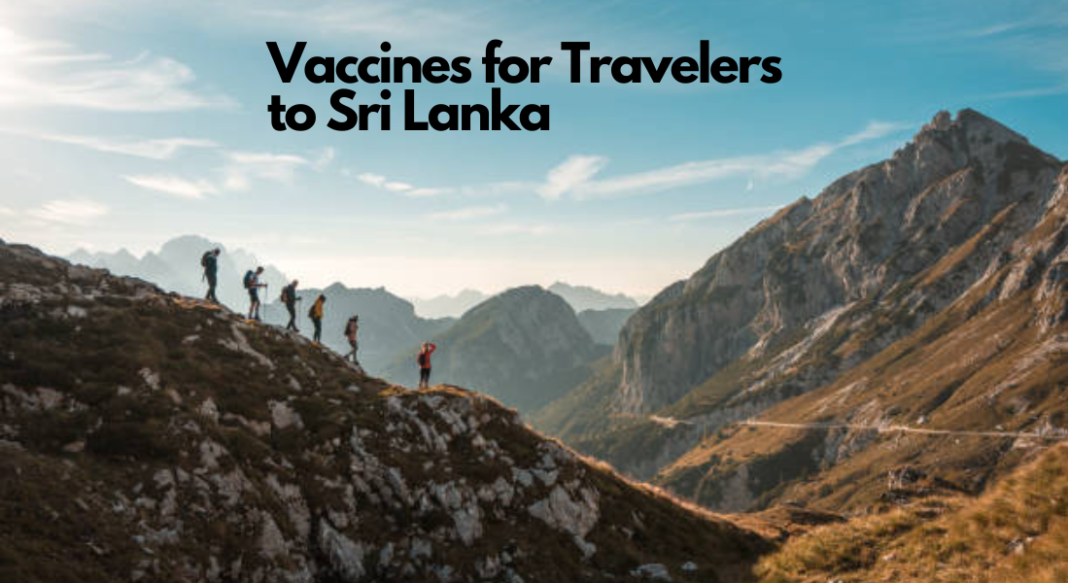Introduction to Vaccination for Travel
Traveling to Sri Lanka can be an enriching experience, offering a rich cultural tapestry, breathtaking landscapes, and unique wildlife. However, to fully enjoy this journey without health concerns, understanding the importance of vaccinations is essential. Vaccination is a critical aspect of preparing for any travel itinerary, particularly in areas with specific health risks, such as Sri Lanka. The country faces a variety of infectious diseases that can pose significant challenges for unvaccinated travelers.
In Sri Lanka, several diseases such as dengue fever, typhoid, and hepatitis A are prevalent. These illnesses can lead to serious health complications if contracted. Hence, the World Health Organization and health authorities recommend that travelers receive vaccinations to mitigate these risks.
When planning travel to Sri Lanka, it is advisable for individuals to consult with healthcare providers several weeks prior to departure. This allows adequate time for vaccinations to become effective and ensures that travelers can meet the suggested timelines for administration.
Moreover, it’s crucial to follow general vaccination guidelines which include checking personal vaccination history, adhering to booster recommendations, and being aware of any potential health advisories issued by local health departments or travel organizations. Proper vaccination not only protects the individual traveler but contributes to the broader public health efforts, reducing the potential for disease outbreaks. Therefore, being vigilant about vaccinations is paramount to ensuring a safe and enjoyable visit to Sri Lanka.
Mandatory Vaccines for Entry into Sri Lanka
When planning a trip to VACCINES REQUIRED FOR SRI LANKA, it is essential for travelers to be aware of the required vaccinations for entry into the country. The government of Sri Lanka has established specific regulations aimed at safeguarding public health and preventing the spread of infectious diseases. One of the most significant requirements is for the Yellow Fever vaccine, which is mandatory for travelers arriving from countries where the disease is endemic.
The rationale behind this regulation is to ensure that those who might potentially carry the Yellow Fever virus do not contribute to its introduction or transmission within Sri Lanka. It is important to note that before entering the country, travelers must present an official International Certificate of Vaccination or Prophylaxis (ICVP) to prove their vaccination status. Travelers must plan accordingly to meet this timeline, ensuring their vaccination is fully effective upon arrival.
Therefore, it is crucial to adhere to these requirements to avoid complications. Moreover, there have been recent updates regarding vaccination policies, indicating a growing emphasis on health safety for both residents and visitors. These updates may evolve, contingent on global health circumstances or outbreaks; thus, it is highly advisable for travelers to stay informed by consulting reliable sources or authorities before their journey.
In summary, obtaining the Yellow Fever vaccine and its corresponding certification is not only a legal requirement but also a responsible action for those traveling to Sri Lanka. Ensuring compliance with these mandatory vaccinations will facilitate smoother entry and contribute to the overall health and safety of the travelers and local population alike.
Recommended Vaccines for Travelers
Traveling to Sri Lanka can be a culturally enriching experience, but it is essential to stay informed about health risks and vaccinations prior to your journey. Among the key vaccinations are Hepatitis A, Hepatitis B, Typhoid, Rabies, and Tetanus.
Hepatitis A vaccination is highly advised, as this virus can be contracted through contaminated food and water. Travelers should get vaccinated at least two weeks before departure to ensure adequate protection. Hepatitis B vaccination is also crucial, especially for those planning to engage in activities that may involve contact with blood, such as medical work or extended travel.
Typhoid fever is another concern in Sri Lanka, particularly for those who may consume food from street vendors or eat in rural areas. The vaccine for Typhoid can be administered orally or via injection, and it is recommended to be received at least two weeks before traveling. This vaccine requires a series of shots, so it is wise to begin the process well in advance.
Conclusion and Health Tips for Travelers
Traveling to SRI LANKAN VISA FOR BOLIVIAN CITIZENS can be a rewarding experience, filled with rich culture, stunning landscapes, and diverse wildlife. Before embarking on your trip, it is essential to consult with healthcare professionals regarding the recommended vaccines for travel to Sri Lanka. Some of the key vaccines may include typhoid, hepatitis A, and Japanese encephalitis, among others, depending on the areas you intend to visit and your travel activities.
In addition to receiving the appropriate vaccines, maintaining personal health during your travels is paramount. Implementing good hygiene practices can significantly reduce the risk of illnesses caused by contaminated food and water, which can be common in various destinations. Travelers should always wash their hands thoroughly with soap and water, especially before eating or after using the restroom. In situations where soap is not available, carrying hand sanitizer with at least 60% alcohol can serve as an effective alternative.
Being mindful of food and water safety is equally important. Additionally, consuming well-cooked foods and avoiding street food can help mitigate the likelihood of foodborne illnesses. It is also prudent to seek travel insurance that includes health coverage to safeguard against unexpected medical expenses.
Ultimately, taking the time to prepare for your travel to Sri Lanka by ensuring you have the necessary vaccinations, practicing hygiene, and being cautious about food and water will help you make the most of your journey. With careful planning and attention to health, travelers can fully immerse themselves in all that Sri Lanka has to offer.

